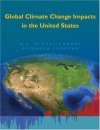' ... the most up-to-date, comprehensive, and authoritative assessment of climate change impacts on the United States. ... [The report] is part of a larger process of public and policy-maker education about what the science is telling us, that one has to hope will contribute to how people think about specific legislative proposals, and the need to move ahead, after many years of dithering and delay.' - John Holdren, assistant to the President for Science and Technology and director of the White House Office of Science and Technology Policy ' ... human-induced climate change is a reality, not only in remote polar regions and in small tropical islands, but everyplace around the country, in our own back yards. It's happening. It's happening now. It's not just a problem for the future. We are beginning to see its impacts in our daily lives. More than that, humans are responsible for the changes that we are seeing, and our actions now will determine the extent of future change and the severity of the impacts. ... it is not too late to act. Decisions made now will determine whether we get big changes or small changes. ... If we take immediate and sustained action to reduce heat-trapping pollution, we can in fact avoid the most severe impacts ... Much of the foot-dragging in addressing climate change is a reflection of the perception that climate change is way down the road, it's in the future, and it only affects remote parts of the planet. ... The report does exactly what is needed at this time, which is to emphasize the reality of climate change, the fact that it is urgent, that we [need to] reduce heat-trapping pollution, and the fact that it is happening everyplace. That is the most important information for decision-makers to hear right now, ... The sooner we focus on getting our house in order, the better we will be prepared to be players on the international scene.' - Jane Lubchenco, administrator of the National Oceanic and Atmospheric Administration 'By comparing impacts that are projected to result from higher versus lower emissions of heat-trapping gases, our report underscores the importance and real economic value of reducing those emissions. It shows that the choices made now will have far-reaching consequences.' - Tom Karl, director of the NOAA's National Climatic Data Center, Asheville, N. C., and cochair of the committee that pulled together the report 'One of the messages that we are trying to make sure people understand is that stakes are high. This really is not an issue that you can think about in terms of, 'oh, these things might happen in 50 years.' Things are happening now.' - Anthony Janetos, director of the Joint Global Change Research Institute at the Pacific Northwest National Laboratory, College Park, MD., a report coauthor 'Elected officials and their constituents ought to be influenced by the kind of material in this report. I hope this whole [issue] of the climate change consequences gets into the bloodstream of the public discourse of the country.' - Rick Piltz, director of the Government Accountability Project's Climate Science Watch, Washington, D. C. 'If the United States and the rest of the world don't act together to address this global issue, we will be leaving generations with a much hotter and much poorer planet. ... [lowering U.S. emissions] is a Herculean task. We can do it, but we have to greatly invest in energy [research and development], use all the tools we have today, and develop the new tools for tomorrow.' - Rosina Bierbaum, codirector of the World Bank's World Development Report 2010, and dean of the University of Michigan's School of Natural Resources and Environment



































